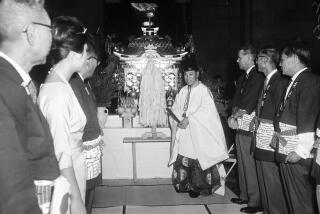
- Share via
BERLIN — On a quiet street corner in Berlin’s Mitte district, a bronze statue of a young girl in a traditional Korean dress glitters in the sun.
Her fists are clenched, her expression tense. She is seated but her heels do not touch the ground. A shadow of an elderly woman is carved into the granite below her. Beside her is an empty chair.
To Germany’s Korean diaspora — 50,000 strong — the statue is a poignant tribute to the 200,000 so-called comfort women who were forced or tricked into sexual slavery by the Imperial Japanese military during World War II.
But to the Japanese government, which has never fully accepted responsibility for this dark history, the statue is propaganda meant to reignite an issue it says was settled long ago.
Cast into the middle of the conflict is the German government, which has become the target of a high-level Japanese lobbying campaign to take down the statue.
Similar fights over memorials to the comfort women have played out elsewhere — including Southern California — but the dispute has special resonance in Germany, with its own travails in coming to terms with an ugly history.
Saudi sex tourists are buying weeklong marriages to young women in Indonesia. Though officially illegal, the practice is an economic lifeline for villages. For the women, it’s ‘torture.’
It was only in 1991 that the first former South Korean comfort woman first came forward in Seoul, setting off a swell of public testimony. Since then, over a hundred memorials have been established around the world.
“It was no small thing for these elderly women to reveal themselves as victims of sexual violence at the time,” said Nataly Jung-hwa Han, who heads Korea Verband, the Berlin-based civic group that commissioned the statue, the first on public grounds in Europe.
It is a replica of a comfort women memorial in Seoul called the Statue of Peace. Han named it “Ari,” which means brave in Armenian.
At the unveiling ceremony in 2020, she stressed that the “statue is not directed against the Japanese government” but “an invitation to come to terms with the past together for the future.”
That’s not how Japanese officials saw it. And to the surprise of many here, it appears that their four-year campaign against the statue is about to pay off.
: :
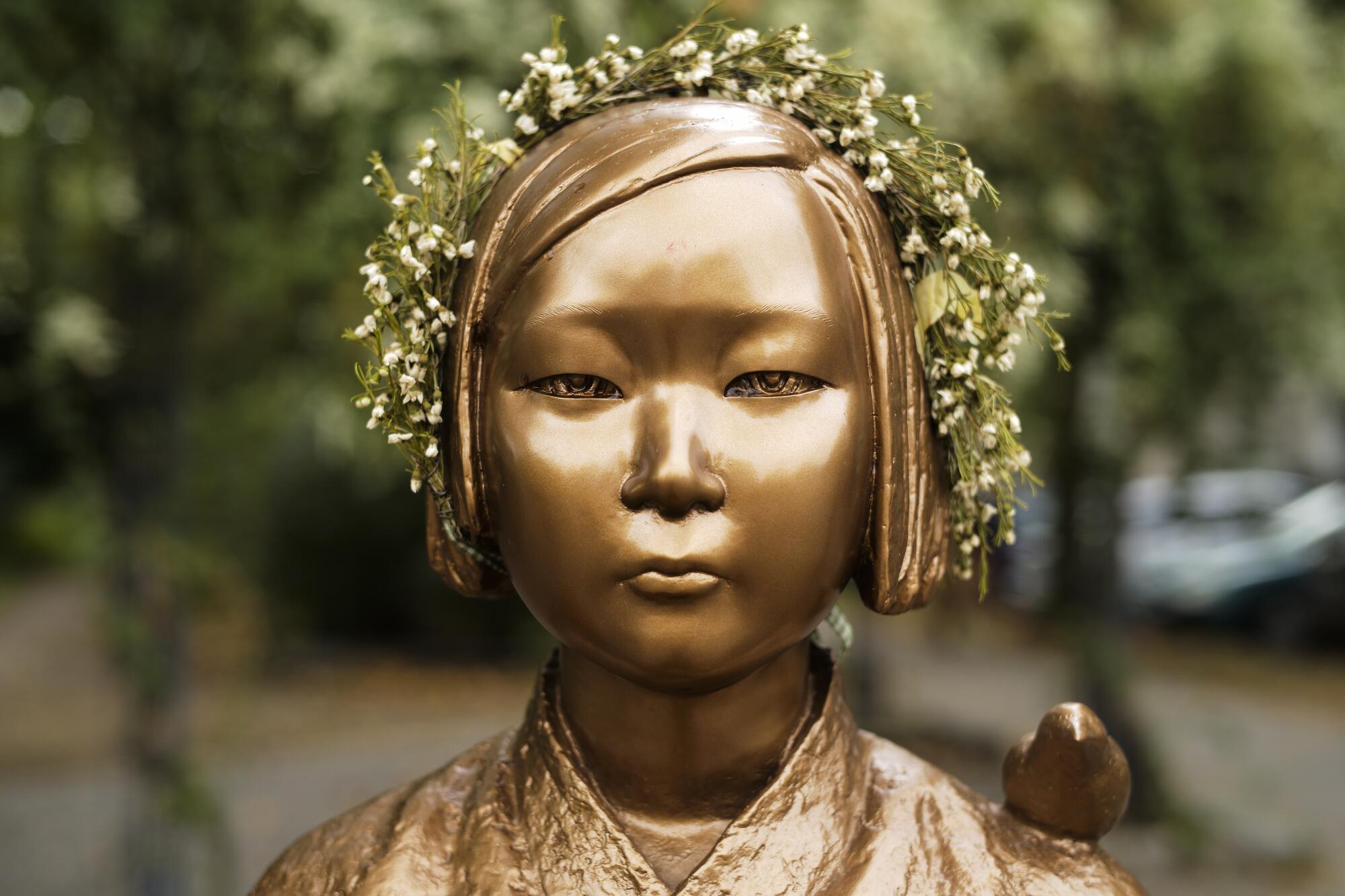
Germany’s wartime sins are etched into Berlin.
Museums and streetside memorials pay tribute to the victims of the Holocaust. Embedded into the ground throughout the city are more than 5,000 Stolpersteine, or “stumbling stones” — each bearing the name of a person killed by the Nazis. And as in much of Europe, denying the Holocaust happened or rejecting key elements is illegal in Germany.
Japan has been far less repentant for its wartime sexual abuse of women, setting it in bitter conflict with South Korea, where the majority of former comfort women have died after decades of campaigning for official recognition.
Just eight of the 240 victims formally registered with the South Korean government are still alive. Some were as young as 12 during the war.
The Japanese government has continued to dispute the term “sex slave,” claiming that there was no evidence of force being used, as well as the 200,000 estimate that is widely cited by historians and includes some victims from China, the Philippines and other places that Japan occupied during the war.
Japan has long considered the issue resolved with an apology in 1993 — in which the government pledged “never to repeat the same mistake by forever engraving such issues in our memories” — and a controversial 2015 agreement with South Korea.
Alongside offers of monetary compensation to victims, then-Japanese Prime Minister Shinzo Abe expressed “his most sincere apologies and remorse.”
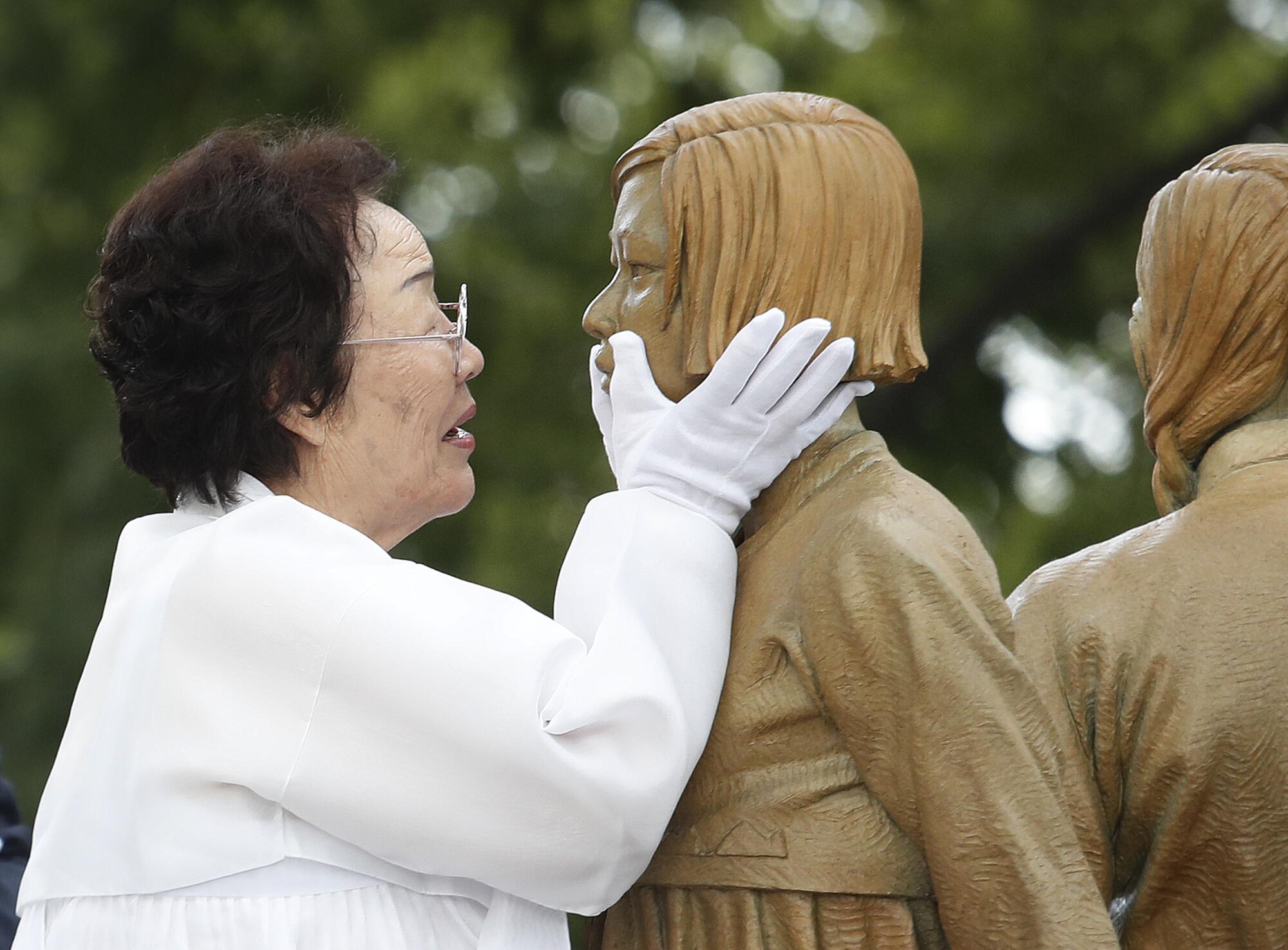
But the agreement, which included South Korea promising to refrain from publicly criticizing Japan over the issue, did not have buy-in from the victims and allowed the Japanese government to stop short of admitting full responsibility.
“The 2015 settlement is representative of this mentality of wanting to draw a line under the past and moving on with your life,” said Dorothea Mladenova, a scholar of Japan at the University of Leipzig.
Masao Fukumoto, a Japanese journalist living in Berlin, said part of the problem is that Japan sees itself as a victim of the war: “The atomic bombs dropped on Hiroshima and Nagasaki play a major role in this.”
Japanese athletes have long been shunned in South Korea. This radio producer is leading a campaign to make an exception for Dodger superstar Shohei Ohtani.
In line with a surge in nationalistic politics that began in the late 1990s, the country has rewritten its history textbooks to downplay its own war crimes.
The same forces are driving a government campaign to suppress public commemoration of comfort women overseas.
Jason Kim, the former deputy mayor of Palisades Park, N.J., recalled the two delegations of Japanese officials who visited the town of 20,000 after it had installed a small plaque commemorating comfort women in 2010.
The first delegation, led by Shigeyuki Hiroki, the Japanese ambassador in New York, began by offering to plant 500 cherry blossom trees, donate books to the local library and start up an exchange program with Japan.
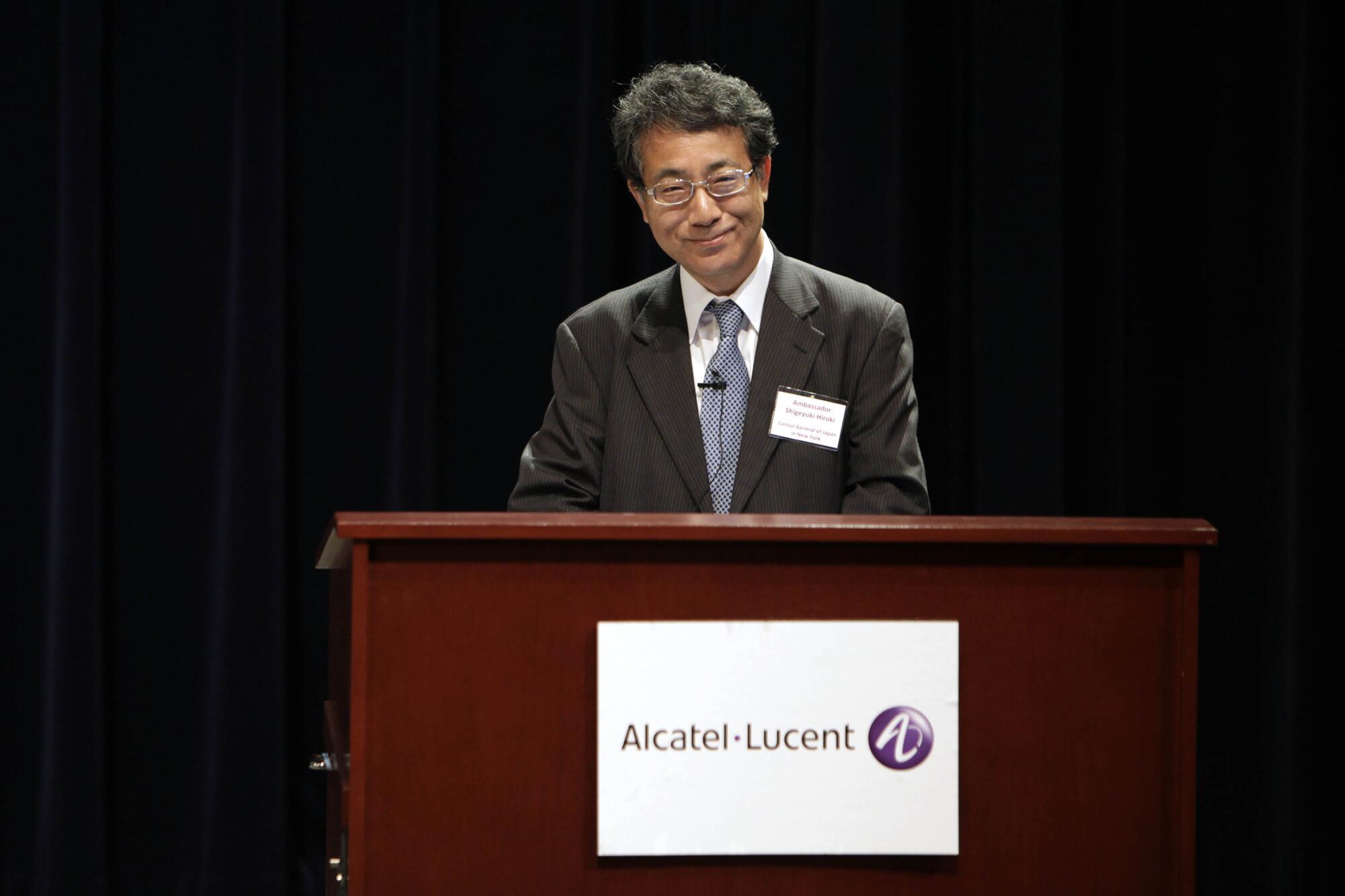
“We were like, ‘Wow, the Japanese government is doing all this in the small town of Palisades Park?’” Kim said.
The official then asked him and Mayor James Rotundo to “perform the good gesture of removing or relocating the monument.”
“I was totally speechless,” Kim said.
After Palisades Park officials declined, the second meeting with three members of the Japanese National Assembly was much less pleasant.
“It was a big fight,” Kim said. “They said it was all lies and that the comfort women were not only paid, but they were paid well.”
As in America, China’s younger generation is seeking a better work-life balance. Enter these new youth-oriented retreats.
On their way out, Kim said, the three lawmakers told him: “This is not the end.”
Since then, similar battles have unfolded in Glendale, where a replica of the Statue of the Peace, installed by the Korean American Forum of California in 2013, prompted a pro-Japan revisionist group to file a lawsuit against the city.
Despite the Japanese government submitting an amicus brief in support of the case, the Supreme Court dismissed it in 2017.
The following year, the Japanese city of Osaka dissolved its 60-year-old sister city relationship with San Francisco to protest a comfort women monument in Chinatown.
Both statues remain.
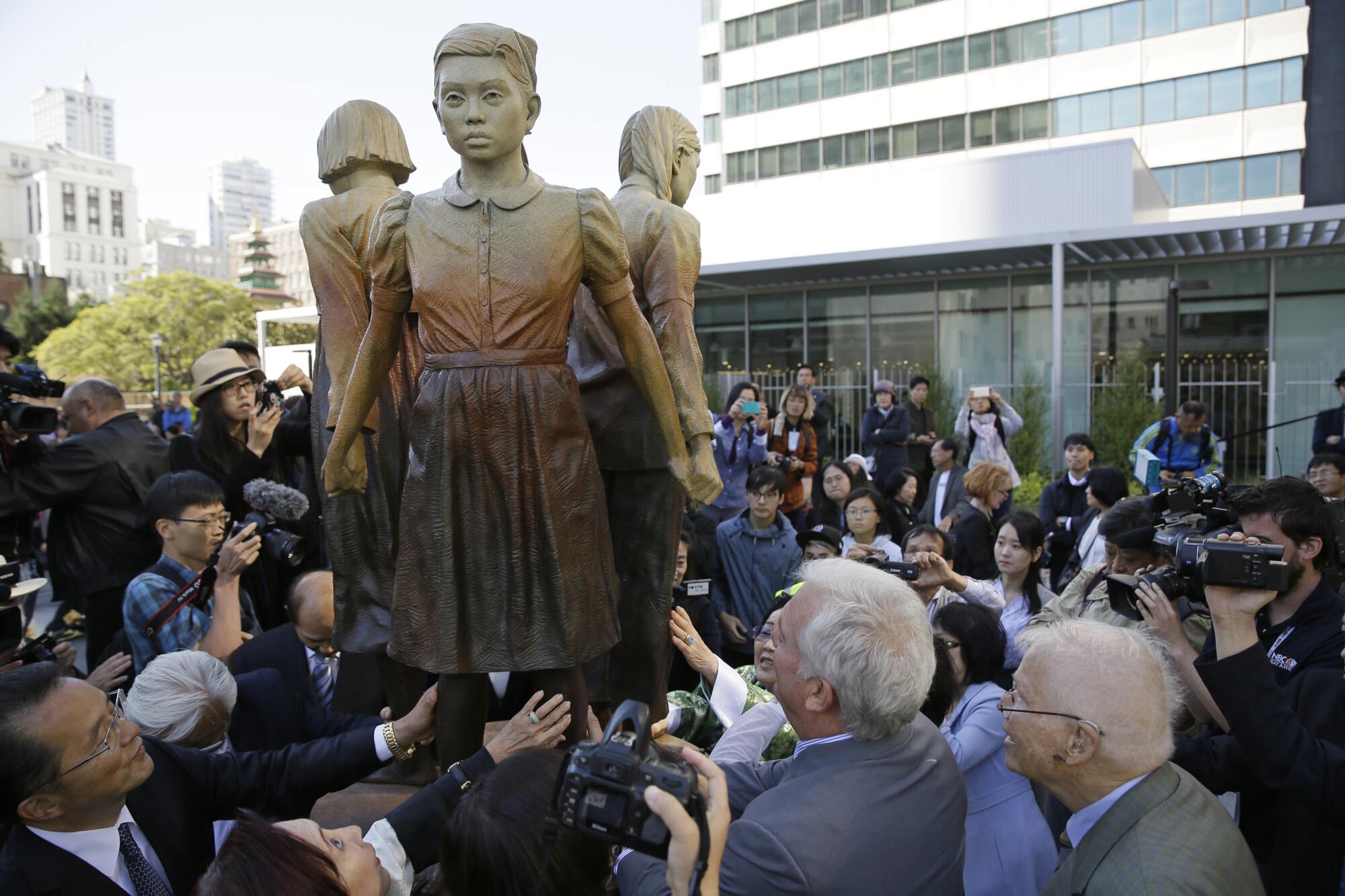
: :
The Japanese government has found a far more sympathetic ear in Berlin.
Since the statue there went up, a procession of high-ranking Japanese officials have lobbied their German counterparts to remove it. Japanese Prime Minister Fumio Kishida even raised the issue with German Chancellor Olaf Scholz at a 2022 meeting about the war in Ukraine.
Kai Wegner, the governing mayor of Berlin, has taken Japan’s position. After meeting with the Japanese foreign minister last May to discuss a development project involving the automaker Mitsubishi, he said in a news release that the statue was a “one-sided portrayal” and that “it is important that we make changes.”
German media has also reported that Wegner had a hand in ending government funding of a Korea Verband educational program about comfort women called “Sit next to me.”
One of his political allies who sits on an advisory board to the Berlin Project Fund for Cultural Education — which had funded the program since 2021 — reportedly told fellow members that Wegner had urged him to reject this year’s grant application to avoid upsetting the Japanese government.
Two years ago Thailand became the first country in Asia to decriminalize marijuana. As in California, it hasn’t worked out as planned.
Separately, the Japanese Embassy invited several of the board members to dinner at a five-star hotel in the city and asked them to vote against the application, state broadcaster RBB reported.
Saša Martinović, a history teacher who has been participating in the program, said the topic of comfort women was deeply relevant to Berlin.
“The German and Japanese fascist regimes cooperated during the war,” he said. “There is a direct connection.”
He added: “In none of the classes did Korea Verband try to push a racist or nationalistic view of Japanese society.”
In a statement to The Times, Berlin Senate Chancellery spokesperson Christine Richter said: “The Senate shares the view of the Federal Foreign Office that the Japanese-Korean conflict regarding the history of comfort women was resolved through the agreement on this issue reached between Japan and Korea in 2015.”
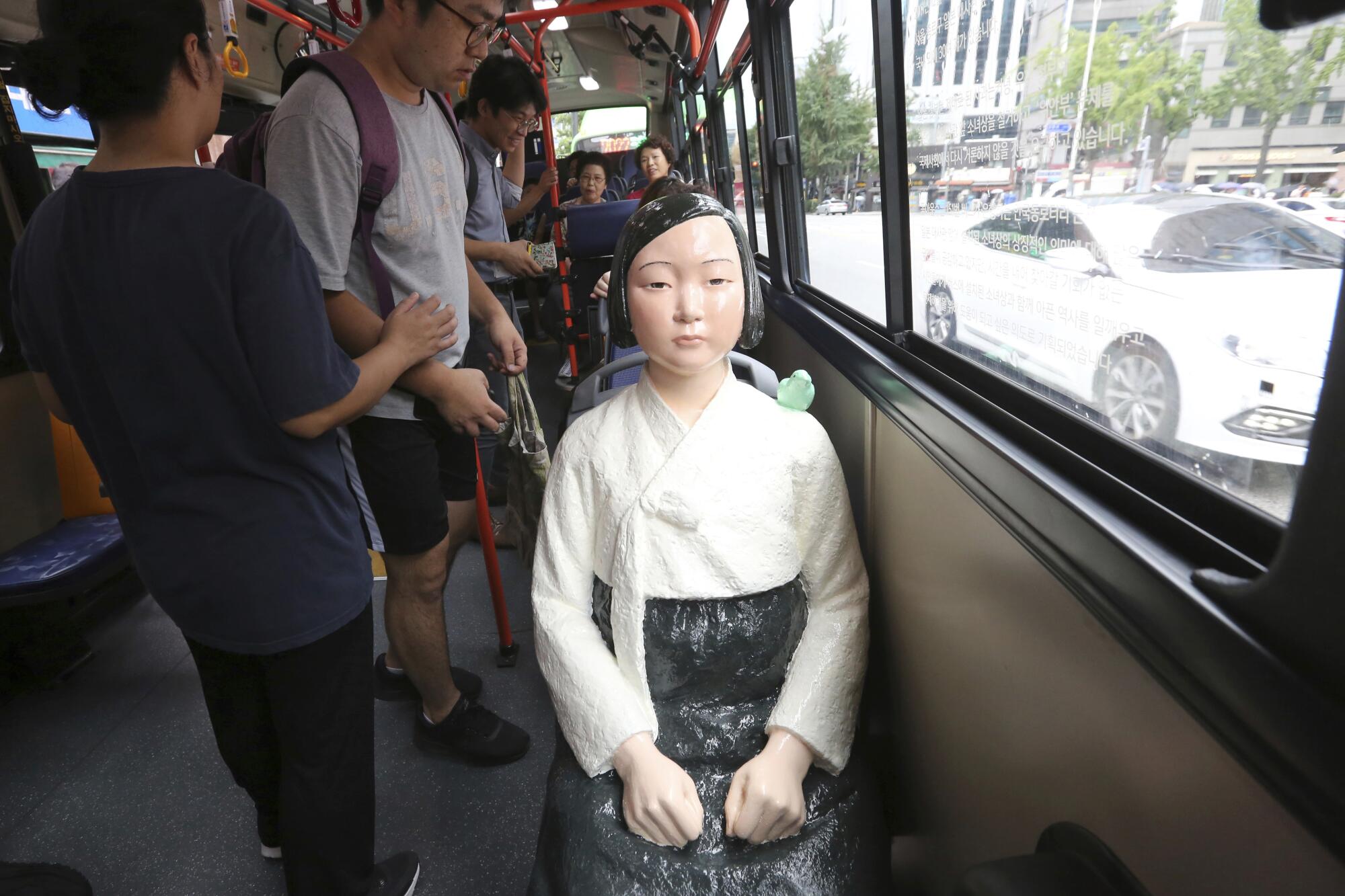
The Japanese Embassy in Berlin said in an emailed statement that the inscription on the Berlin statue — which includes the term “sexual slavery” — was “one-sided” and “inaccurate.”
“The comfort woman statue serves as a symbol permanently denouncing Japan,” it said.
In July, the Mitte district office gave Han and her Korea Verband group until late September to voluntarily remove the statue.
“I’m afraid they will take the statue away overnight,” Han said.
In a statement to The Times, a spokesman for the Mitte district office confirmed that it had held several discussions with Japanese officials, but denied that this had influenced its decision.
“The statue only received temporary permission, and there was never any question of a permanent installation,” the spokesman said, citing a local law that says permanent art installations must be selected through public competitions.
: :
To replace the statue, city officials have endorsed a generalized monument against sexual violence — one that doesn’t single out Japan.
But the suggestion has left some questioning whether Berlin can turn back the difficult moral questions the statue has already opened.
“It really smells like ‘all lives matter,’” said Mladenova, the Japan scholar.
“A new monument would not have the same history,” she said. “The current statue symbolizes the mechanisms that you find in sexual violence in that once the survivors speak out, there’s a lot of silencing.”
Mladenova also pointed out that the statue is the only public monument in Berlin that speaks to Germany’s Korean diaspora, which got its start with a migrant worker program in the 1960s.
“You have all these people here who are not originally from Germany, and they come with all their histories and they don’t have representation in the monuments or memory culture,” she said.
“We are an immigration society in Germany, but I think people have not realized it yet.”
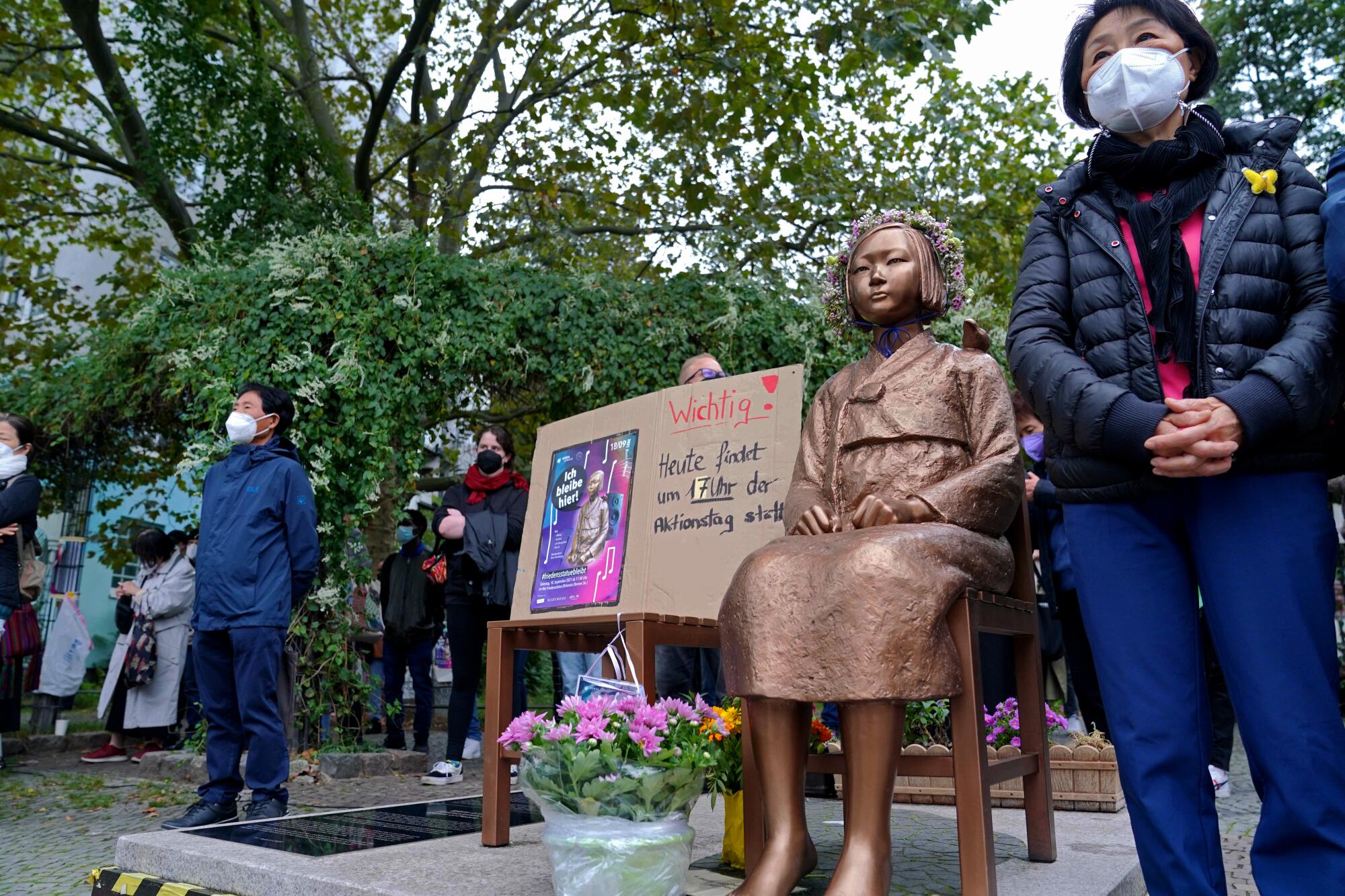
For Han, who emigrated from South Korea to Germany in 1978 with her mother, the statue has begun to feel like more than just a badge of her heritage, but an inflection point in the city’s broader racial equality movement.
“The situation here is very different from the United States, where the second, third and fourth generations of immigrants have advanced into positions of power,” Han said. “Things are only getting started here. And until now, we lived in silence.”
Among the first groups to express their support for the statue was the Armenian community, itself carrying a history of genocide and wartime sexual violence. Messages of solidarity have also streamed in from other diaspora groups in Germany.
Anab Awale, a district councilor in Mitte who is Somali German, said the nonchalance of German officials toward comfort women revisionism was clear evidence that Germany’s own racial inequalities remain unresolved.
“We are still at the very beginning of confronting Germany’s colonial past and the related institutional racism,” she said.
For some, this place the statue has found in Berlin’s fabric, far beyond the diplomatic conflict, is reason enough for it to stay.
It was a breezy day in late August, and Richard Linke, a 68-year-old retired factory worker who lives in Mitte, gazed at the statue from a bench.
He likes to watch children sit in the empty chair while their parents snap a photo and read them the inscription. Sometimes he will buy flowers from the shop across the street to lay at the base. Earlier this year, he signed Korea Verband’s petition to keep the statue in place.
“It’s become a part of the neighborhood,” he said. “It represents freedom and peace. Of course it belongs in Berlin.”
More to Read
Sign up for Essential California
The most important California stories and recommendations in your inbox every morning.
You may occasionally receive promotional content from the Los Angeles Times.




